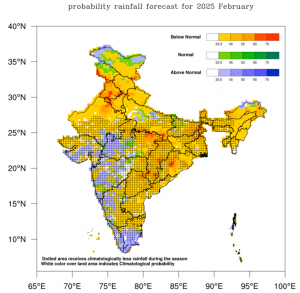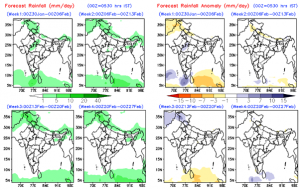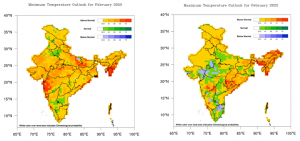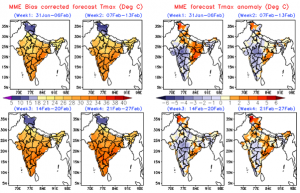Warmer February, Dry Spell Raise Concerns for Indian Farmers
IMD Warns of Higher Temperatures, 72% Rainfall Deficiency in January Adds to Woes
With February set to bring above-normal temperatures across India, concerns are mounting over the fate of wheat, mustard, and other key Rabi crops. The India Meteorological Department (IMD) has predicted warmer days and fewer cold waves, raising the risk of crop damage and yield reductions.
Compounding the problem, January 2025 recorded the lowest rainfall since 1901, registering a 72% deficiency. Key agricultural states such as Punjab, Haryana, Uttar Pradesh, and Madhya Pradesh are already feeling the heat, both literally and figuratively, as moisture levels drop at a crucial crop growth stage.
Weather Outlook: More Heat, Less Rain
According to the IMD, maximum and minimum temperatures will remain above normal in most parts of India throughout February. The lack of winter rainfall has been attributed to weak and infrequent Western Disturbances, which typically bring much-needed showers to North and Central India during this time of the year.
“The persistence of dry weather and rising temperatures could accelerate crop maturity, affect grain quality, and lower overall yields,” an IMD official said.
In January, Northwest India saw an 80.6% rainfall shortfall, while Central India faced an alarming 96.1% deficit. The Western Himalayan region, which supplies snowmelt water to major river basins, also received 85% less precipitation than normal. This shortfall threatens not just the current Rabi crops but also future water availability for summer crops.
Impact on Crops: Wheat, Mustard, Pulses at Risk
The sudden rise in temperatures is expected to have serious consequences for winter crops, especially wheat—the country’s staple grain.
Wheat: The crop is in its flowering and grain-filling stage, a critical period requiring cool temperatures. Excess heat can shorten this phase, leading to smaller grain size and lower yields.
Mustard: Higher temperatures may cause early maturity, affecting seed and oil content. A lower mustard harvest could push up edible oil prices, forcing India to import more palm and soybean oil.
Chickpeas (Chana): A key protein source for millions, chana crops may see poor pod formation and reduced yields, impacting availability and prices.
Horticultural crops are also likely to suffer. Apple orchards in Himachal Pradesh and Jammu & Kashmir depend on extended winter chills, but higher temperatures may disrupt the flowering and fruit-setting process. Vegetables like potatoes, tomatoes, and leafy greens could also be hit by heat stress, leading to quality and supply issues.
Rainfall


Temperature


(Source- IMD)